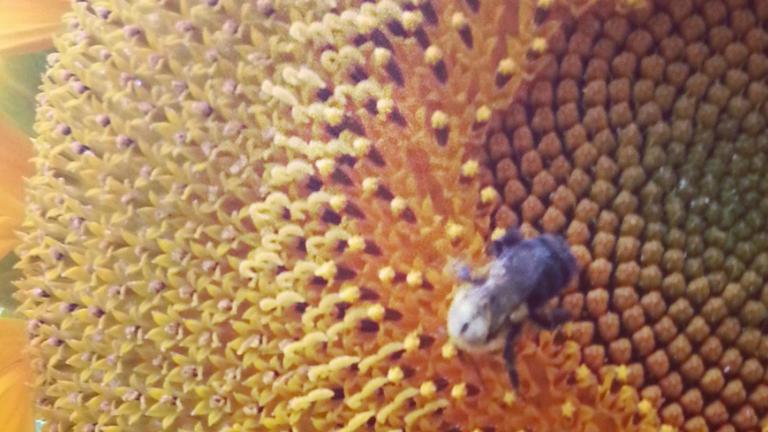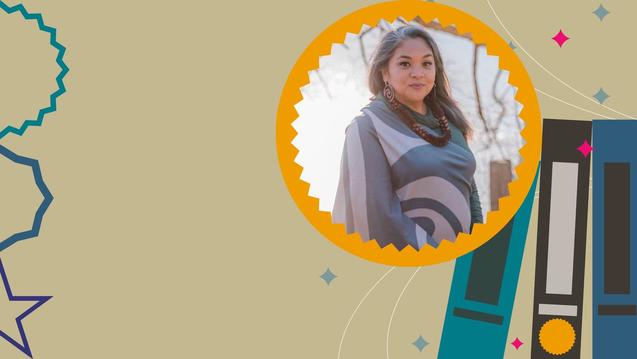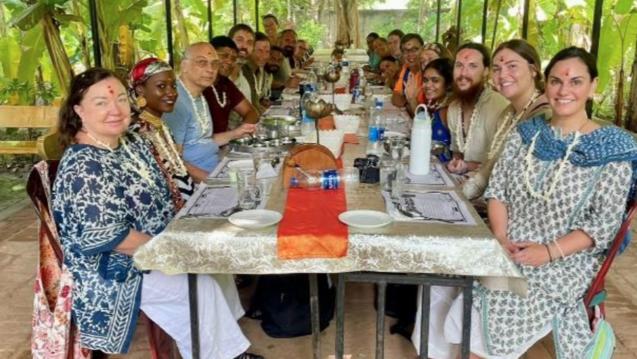
Healing the Binary
A Mestiza Experience of the Feminist Intersectionality of Wounding, Healing, Spirituality and Activism
There are a few moments in life where time slows down and pauses in-between words seem to last forever. It feels like the universe is listening and our destiny is being woven from the happenings of that very moment.
I had such a moment on April 24, 2015, when I was given the honor to present on a very intimate topic alongside legendary women. The Women's Spirituality Program was being highlighted at the CIIS Founders Symposium and there was to be a panel of three to present on various topics related to the title "The Divine Feminist." The weaving of spirituality and social justice has been my primary topic of inquiry throughout my Master's work; therefore, when I was invited to speak I was excited and relaxed. When I heard who was to sit beside me on the panel, I suddenly realized the importance of this presentation. Professor Arisika Razak and Dr. Alka Arora are two individuals who have spent decades shaping lives, empowering hearts and minds, and making major contributions to heal individuals and society. What could I offer that would be honoring the caliber and contribution of these two extraordinary women? The answer arose from the tenderness of my own personal experience.
Below, you will find a weaving of poetry and academic expression. The process of examining the nuances of identity ended up being a soothing serum to the years of conflict that came with residing at the "intersections."
This document is a talisman in my journey of healing and wholeness.
************************************************************************************
Soy una mestiza. I am a woman of mixed racial, ethnic, and cultural ancestry.
Like the varied threads in a weaving, the combinations are woven into the color and complexion of my skin, the shade and texture of my hair, the bone structure of my face and of my hips, and the songs of my heart.
I walk between worlds.
I walk between brownness and whiteness, working class and affluence, heterosexual and bisexual- I taste all but claim none as my own.
The late and great Gloria Anzaldua describes this hybrid identity as a new mestiza consciousness : a "racial, ideological, cultural and biological cross-pollination."
Dominant society is threatened by such awareness because it is built upon patriarchal structures of hierarchy and oppression. Patriarchy, a societal system that upholds male dominance in both public and private sectors, fosters a way of binary thinking that values certain aspects of life over others:
Whiteness over Brownness/Blackness
Maleness over Femaleness
Individual over Community
Heterosexual over Queer
Rich over Poor
The mestiza experience threatens this structure because it is one of fluidity and inclusivity. Our very existence shatters this binary illusion and reveals life as shades of color rather than black and white. Our very existence shatters the illusion that some are more valuable than others- we have been on either side of the fence and have seen the beauty, medicine, and brilliance that connects the land under this illusionary boundary. The mestiza journey changes our society by the mere stepping of our feet.
Leela Fernandes talks about such social change and describes it as a twofold process: letting go of the attachments to power, privilege, and control that result from systemic hierarchy, while cultivating a spiritual sense of self that is beyond the identity of attachments. If this process is footwork to a dance of my mestiza experience, then Feminism is the music to which we I base my rhythms.
I define Feminism as the intellectual and spiritual commitment to healing from and transforming systemic oppression. A practice that grew from a seed planted in pursuit of gender equality, Feminism has transformed into many "waves" of thought. My understanding of what it means to be a woman is profoundly shaped by my Mexican heritage and my family's relationship with money and access. I resonate most strongly with the manifestations of feminism that include an analysis of race and class alongside gender.
Alice Walker's term, Womanist, feels like home. While it is rooted in the black female experience, Walker shares aspects that speak to my experience as a mestiza of Latina descent.
Womanist:
- A Feminist of color. Usually referring to outrageous, audacious, courageous or willful behavior. Wanting to know more and in greater depth than is considered "good" for one.
- A woman who loves other women, sexually and/or nonsexually. Appreciates and prefers women's culture, emotional flexibility, and strength. Committed to survival and wholeness of entire people, male and female. Not separatist, except periodically, for health.
- Loves music. Loves dance. Loves the moon. Loves the Spirit. Loves love and food and roundness. Loves struggle. Loves the Folk. Loves herself. Regardless.
- Womanist is to feminist as purple to lavender.
Womanism speaks to my experience of walking in my skin. My experience of bleeding with the moon. My experience of loving men and loving women. Of painting as meditation and reclaiming my heritage from the grasps of assimilation as medicine. Of seeking healing through food and herbs. Of honoring my creative expression as a radical tool of political defiance.
It is from this inclusive acknowledgement of land, bone, and spirit that I heal the pieces of myself that have been torn, neglected, and abused. For me, healing looks like touching my body in self-love. It looks like finding the courage to contemplate how the experience of sexual assault has individually and collectively shaped the lives of loved ones and myself. It looks like owning my white, cisgendered able-bodied, privilege and using it to interrupt oppression. It looks like the painful acknowledging that the legacy of both the oppressor and the oppressed reside within my blood.
To hold such contradiction is painful.
I am both the knife that cuts and the flesh that bleeds.
I have found it easier to sit with the wound than to hold the hand does the wounding. At times, I am not sure my heart is wide enough to acknowledge the ways in which my white ancestors colonized, brutalized, violated, exploited, and oppressed the same people who gifted me the brown pigment of my skin, alongside others. Who am I if aspects of myself are built upon generations of spilled blood?
I discover that the hand that holds the knife also suffers wounding of the flesh.
In my work to end systemic oppression such as racism, sexism, and homophobia, I am healing the wounding on both sides of my family tree. To journey across such dark and sorrowful lands, I have cultivated a spiritual practice for protection and strength.
La Virgen de Guadalupe, please steady my hand and strengthen my heart.
Please use me as a vessel to bring healing and light to this world.
Spirituality is the practice of honoring the interconnectivity of existence. It is the art and science of choosing intentional thoughts, words, prayers, and actions to help ease the suffering of the self and world around us. It is the acknowledgement of the ways in which we are all connected and the cultivation of such connective tissue. These fibers enable my heart to repair and grow an infinite number of times. They lead me back to flashes of joy in daily moments. They hold and protect me like vibrantly colored clothing from the elements.
It is my spiritual path to walk this world in a healing way. My commitment to social and environmental justice is made of mind, heart, and soul. Rev. Zenju Earthlyn Manuel speaks to my mestiza experience when she offers the Multiplicity of Oneness. In both spiritual and social justice spaces, "we may think that oneness should exclude marks of diversity like race, sexuality, and gender, yet oneness is inclusive of everything in our lives."
Like a garden that nurtures both plants of shade and sun, we must honor differences while never losing sight of the grand interconnectivity.
I believe the next spiritual and social revolution will take place in such a hybrid place of inquiry: honoring the differences in physical embodiment and how it contributes to our experiences of life while fostering the connective tissue of spirit.
For me, Women's Spirituality has been the breathing room for such work.
It is an approach to life that sees existence as sacred:
we value all forms of life- female, male, transgendered, black, brown, white, yellow, red, queer, straight, disabled, abled, sick, healthy, animal, plant, and spirit,
we honor mystery and the great unknown,
we explore the intersections of personal and societal healing,
we reclaim the female voice from the forgotten folds of history,
we bring empowerment and healing to those who our patriarchal society has abandoned and abused,
we treat land as we do our bodies and honor the rhythms of Mother Nature,
we examine ourselves to painfully remove the leaded weight of oppression so that we may stop harming ourselves and stop harming others,
we seek justice for our brothers and our sisters in the way we would fight for our own lungs to breathe.
If my experience as a mestiza is the action of my feet moving upon the Earth, womanist feminism is the song and rhythm of my dance, spirituality is the protective and vibrantly colored clothing on my back, and Women's Spirituality is the expansive sky under which I dance.
I dance for you. I dance for me. I dance for all of us.
Related Academic Programs
Related News
CIIS Professor Emeritus and founding director of Philosophy, Cosmology, and Consciousness Richard Tarnas returned for his beloved annual lecture exploring the deeper currents of our time.
Dr. Gerry Ebalaroza-Tunnell, a graduate of the Department of Transformative Inquiry, won an International Impact Book Award for her recent children’s book, Let’s Live A.L.O.H.A.
Sasha Bainer, an East-West Psychology student, provides us with insights into their firsthand experience of Auroville.



